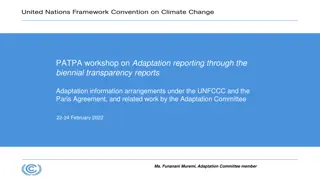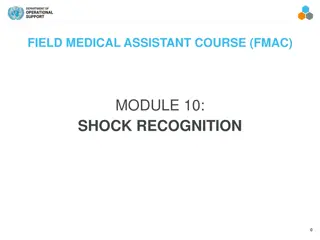Cultural Adaptation: Understanding Culture Shock and the Adaptation Process
Cultural adaptation involves facing culture shock when living abroad, experiencing various symptoms like homesickness and conflict, understanding cultural variations in body language and perceptions, and going through stages of adaptation from fun and excitement to biculturalism. Tips and insights are provided to navigate the challenges encountered during the adaptation process.
Download Presentation

Please find below an Image/Link to download the presentation.
The content on the website is provided AS IS for your information and personal use only. It may not be sold, licensed, or shared on other websites without obtaining consent from the author.If you encounter any issues during the download, it is possible that the publisher has removed the file from their server.
You are allowed to download the files provided on this website for personal or commercial use, subject to the condition that they are used lawfully. All files are the property of their respective owners.
The content on the website is provided AS IS for your information and personal use only. It may not be sold, licensed, or shared on other websites without obtaining consent from the author.
E N D
Presentation Transcript
Cultural Adaptation Culture Shock, Adaptation Stages and Tips
Culture Shock Feeling isolated while living abroad for an extended period of time Being cut off from one s culture, family, language Having one s values, traditions, routines in question Being expected to be highly functional within a foreign environment
Some Symptoms Homesickness Withdrawal Sadness/crying Family conflict Inability to concentrate Too much/little sleep Too much/little eating/drinking Anger/irritability Illness
Cultural Variations Body language Courtship practices Perceptions of beauty Hierarchy & leadership Cleanliness & hygiene Concepts of fairness
CHANGE TIME EQUALITY INDIVIDUAL INITIATIVE FUTURE INFORMALITY DIRECTNESS RULES TRADITION HUMAN INTERACTION RANK GROUP INHERITANCE PAST FORMALITY INDIRECTNESS NEGOTIATION Adapted from The Values Americans Live By by L. Robert Kohls
Ask your neighbor Have you experienced culture shock before? What is one way you ve been surprised since arriving in the US? How do you think your experience of those surprises might evolve over time?
4 STAGES OF CULTURAL ADAPTATION STAGE 1: FUN AND EXCITEMENT STAGE 2: IRRITATION AND HOSTILITY STAGE 3: GRADUAL ADJUSTMENT STAGE 4: ADAPTATION AND BICULTURALISM Source: Window on the World, Inc.
Stage 1: Fun and Excitement The honeymoon period Relief that you are finally here Great expectations Everything is new, fascinating, intriguing, exciting Focus is on how we are all alike
Stage 2: Irritation and Hostility Focus changes from similarities to differences Differences are frustrating Students may feel inadequate and unproductive Little difficulties become major problems Reality sets in
Stage 3: Gradual Adjustment Have adopted some of the local values and customs Feel less isolated Increase in self confidence Gradually learning to function well under new conditions
Stage 4: Adaptation and Biculturalism Increased enjoyment of new context Ability to function in two cultures with confidence Feeling that life may be just as good or better than before Realization that there will be things you will miss when you leave
Key Challenges Formal vs. informal writing Understanding instructions Communicating with faculty and classmates Participating in group/classroom discussions Managing coursework load
Keys to Cultural Adjustment Participate in social activities Create new support systems Take care of yourself Improve your language skills Experiment, expand and explore
General Tips Use Google and the RSPH website to find info Use Wikipedia only to find other sources Look ahead and make appointments in advance RSVPand don t be a no show Don t be offended by government or other officials (i.e. the DMV) Talk to a counselor Make new friends Be kind to yourself, manage your expectations and remember you re not alone! Give yourself a break and manage your expectations!
Just when the caterpillar thought the world was over, she became a butterfly. Barbara Haines Howett, Ladies of the Borobudur
YOUR RSPH STUDENT/ALUMNI PANELISTS: Shreya Kothari Joyce Beyamu Bishan Huang Jiabei He Got questions? Ask the experts!























